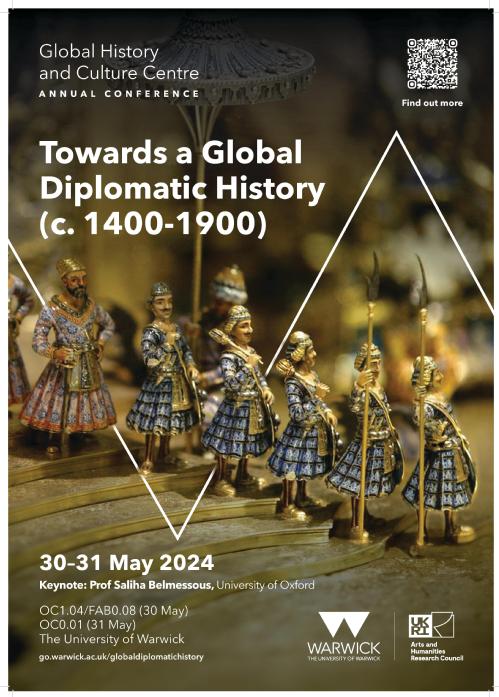Towards a Global Diplomatic History (c.1400-1900)
30-31 May 2024, University of Warwick
What does a truly global history of diplomacy look like? How can we research and write diplomatic history in a way that takes full account of the formative contributions of actors and conceptual traditions from around the world? The history of diplomacy is conventionally written as a story centred on Europe. Central ingredients of the traditional narrative are the city states of Renaissance Italy, the Westphalian system, the rise of the modern nation state, and the dissemination of a system of international law rooted in European legal theory. Taken together, we have long been told, these factors led to the emergence of the modern international order in the nineteenth century.
In recent years, the central tenets of this narrative have been widely contested even for Europe itself, while a growing body of research on the conduct of inter-polity relations in Africa, Asia, and among Indigenous communities in the Pacific and Americas have provided us with a much fuller understanding of the global scope and transcultural development of the conduct of relations between political communities. However, despite this recent increase in local and regional case studies covering different parts of the world, a new integrated narrative about the global and interactive development of diplomatic norms, concepts, institutions, and practices from the early modern period onwards has yet to be written.
The AHRC-funded Global Diplomacy Network seeks to put into conversation and integrate local and regional histories of diplomacy. It aims to establish a connected account of global diplomatic history, one that can replace existing Eurocentric narratives with a new spatial and temporal understanding of the global origins of inter-polity exchange. In this first conference, we invite participants to reflect on the methodological possibilities and challenges of writing global diplomatic history. Speakers will present 20-minute papers that engage explicitly with the transregional dynamics that shaped the conduct of diplomacy in one or more parts of the world.
Programme Link opens in a new window- AbstractsLink opens in a new window
Key questions
- What were the principal agents and processes driving the development of inter-polity relations in different parts of the early modern world?
- How did diplomatic norms, structures, and practices of varying cultural origin influence one another and change as the result of global entanglements?
- What new diplomatic practices were forged through inter-regional interactions, and which were abolished or marginalised?
- What role did non-Western communities and concepts play in the emergence of the global diplomatic system?
Global Diplomacy Network
The Global Diplomacy NetworkLink opens in a new window aims to produce a new understanding of global diplomatic history that moves beyond the traditional Eurocentric narrative. It brings together a global community of scholars to examine the contributions of diplomatic actors and conceptual traditions from around the world.
Coordinated by Lisa Hellman (Lund University), Birgit Tremml-Werner (Stockholm University), and Guido van Meersbergen (University of Warwick), the Global Diplomacy Network is supported by funding from the Arts and Humanities Research Council (2024-2025).


